About Cyber Patrol
We are a team from the Indonesian National Police dedicated to ensuring the security of netizens in cyberspace. Our mission involves monitoring, preventing, and investigating all forms of cybercrime. Additionally, we actively engage in public education, enlightening netizens about the implementation of the Information and Electronic Transactions (ITE) Law. Our goal is to empower individuals to avoid falling victim to cybercrime. Through this platform, let's collaborate in the fight against cybercrime to realize Indonesia's digital sovereignty.






